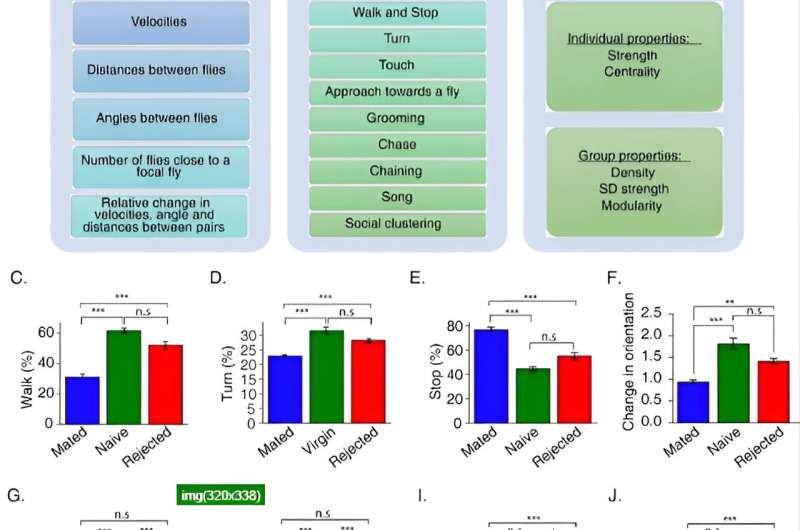This article has been reviewed according to Science X's editorial process and policies. Editors have highlighted the following attributes while ensuring the content's credibility:
fact-checked
peer-reviewed publication
trusted source
proofread
Repeated sexual failures cause social stress in fruit flies

Repeated failures to reproduce make fruit flies stressed and frustrated, which in turn makes them less resilient to other types of stress, Julia Ryvkin at Bar-Ilan University and colleagues report in PLOS Genetics.
Animals are motivated to take actions that improve their survival and reproduction through reward systems in the brain, but failure causes stress. The reward systems have been extensively studied, but less attention has been paid to how animals respond to failure. To investigate, researchers compared the behavior of male fruit flies (Drosophila melanogaster) that had experienced repeated sexual rejection, with males that had recently mated and naïve males that had been kept in isolation.
They found that rejected males were more active, more aggressive, and less social towards other males—indicating a frustration-like state of stress. Rejected males were also less resilient to two other types of stress: starvation and exposure to a toxic herbicide that causes oxidative damage. To understand how this stress response is controlled in the brain, the researchers manipulated the signaling system of neuropeptide F, which is involved in reward processing and aggression.
Inhibiting neuropeptide F receptors made flies less resilient against starvation, mimicking the effects of repeated sexual rejection. Using a technique called optogenetics, which uses light to stimulate activity in specific cells, the team activated neuropeptide F receptor neurons and found that this also reduced the flies' ability to withstand starvation.
These results show for the first time that fruit flies experience social stress when their attempts to mate repeatedly fail. The response is mediated by a brain signaling system involving neuropeptide F, which also plays a role in reward- and stress-responses in other organisms. This offers an opportunity to further investigate social stress in a model organism with a simple nervous system, the authors say.
More information: Julia Ryvkin et al, Failure to mate enhances investment in behaviors that may promote mating reward and impairs the ability to cope with stressors via a subpopulation of Neuropeptide F receptor neurons, PLOS Genetics (2024). DOI: 10.1371/journal.pgen.1011054
Journal information: PLoS Genetics
Provided by Public Library of Science





















